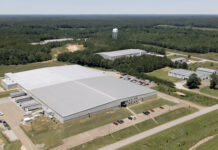
By Jon W. Sparks
From the May/June 2015 issue
According to Larry Jensen, Memphis water is a gift. Jensen, President and CEO of Commercial Advisors, LLC, has become a champion of what he said is probably “the sweetest and softest water in the world.” It’s also plentiful, a status not universally enjoyed as anyone in the drought-stricken Western U.S. will tell you.
It boils down, Jensen says, to three essentials: quantity, quality and cost. And each one of those elements is very nearly unrivaled, which means when you take a sip, you’re tasting some refreshing economic development.
Jerry Collins, president and CEO of the Memphis Light, Gas and Water Division, said, “Memphis may be the most water-rich city in the whole world because we have this huge river that flows past Memphis and none of our drinking water comes from that river. All of our drinking water comes from artesian wells and an underground aquifer which is 400 to 1,200 feet below the surface.”
The Memphis Sands aquifer has 99.8 trillion gallons of water in the Greater Memphis region. Imagine, Jensen said, just a portion of that, some 57 trillion gallons: “If you took the water beneath Shelby County and put it on the surface, it would cover the county almost to the top of the Clark Tower.”
As for quality, the water is naturally filtered through clay and sand. When taken from some 250 wells in the area it’s aerated to eliminate some iron and dissolved gases. “Basically, it’s getting oxygen into the water,” Collins said. And then there’s filtration which, he said, “just takes iron out of the water.” Finally, it’s treated with minimum levels of chlorine and fluoride as mandated by the EPA.
The cost is reflected in that industrial utility customers have the lowest water bill in the nation. “Many cities have water prices for the same amount of water that are two to three times higher than what our citizens pay,” Collins said.
And for many businesses, that’s a bonus. “We’ve got a client here in Memphis,” Jensen said, “who tells me the water they get out of the pipe into their place is of almost distilled quality. That means they don’t have to prepare the water for production—it’s ready to be used.”
That’s a triple whammy when it comes to showing businesses, from restaurants to manufacturing plants, that Memphis is the place to be.
“It’s going to get more and more important to recruitment,” said Mark Herbison, Senior Vice President for Economic Development with the Greater Memphis Chamber. “We already have rail, road and river, which other places have, but they don’t have this pure and abundant water.”
Herbison said the Chamber is increasingly focusing on the purity of the water in Memphis. Companies elsewhere, he said, “spend a lot of money to get purity of water—it can mean millions of dollars a year in chemicals and equipment.” The Chamber, he said, is working with a consultant to develop information specific to various sectors in manufacturing, such as electronics, food, heavy industry and refineries. The data will provide answers to companies who are concerned about availability, purity and costs of water.
And it’s highly likely that Memphis will emerge looking mighty good.

For one thing, the process of getting water is easier and simpler than in most places: It’s pulled out of the ground already well filtered and there’s plenty of it. Imagine the aqueducts in California that are hundreds of miles long. Or think of Atlanta, which gets most of its water from the Chattahoochee River and Lake Lanier. In 2007, Atlanta was hit by a drought that left it with less than a 90-day supply of water. Jensen vividly remembers driving by Lake Lanier: “It looked like you could walk across it.”
Then there’s the issue of keeping it clean. Nashville gets its water from the Cumberland River. The problems with river-supplied water essentially don’t exist in Memphis. (If Memphis got its water from the Mississippi, the treatment costs would be about three times as much as it is now). There is also the fact that the water is so clean and available that it’s less expensive to deal with. Because it’s so pure to begin with, Memphis water can be further purified at far less cost than elsewhere. Research hospitals, laboratories, high-tech manufacturing and similar industries need ultrapure water. “Average costs for a gallon of ultrapure water in Memphis is $1,” Herbison said. “In Minnesota, it could be up to $15 a gallon.”
There is, furthermore, the lower cost of water re-use and maintenance. “A manufacturing facility with a cooling tower can reuse Memphis water for something like 8 or 10 cycles,” Herbison said. “Some places elsewhere you can only cycle once. So it’s a huge, significant savings just being here.”
The big question that looms over all of this: is Greater Memphis taking care of its golden goose? While the amount of water in the aquifers is known and the amount coming out is known, it’s not clear what the rate of replenishment is.
“The question is,” Jensen said, “do we have a plan to be good stewards?”
That question is being addressed by the new Blue Stream Task Force established by the City of Memphis. Some 50 representatives of business, government and nonprofits will figure out how best to move ahead.
















![[VIDEO] Get More for Your Business in Ardmore. Oklahoma](https://businessfacilities.com/wp-content/uploads/2024/02/maxresdefault-324x160.jpg)
